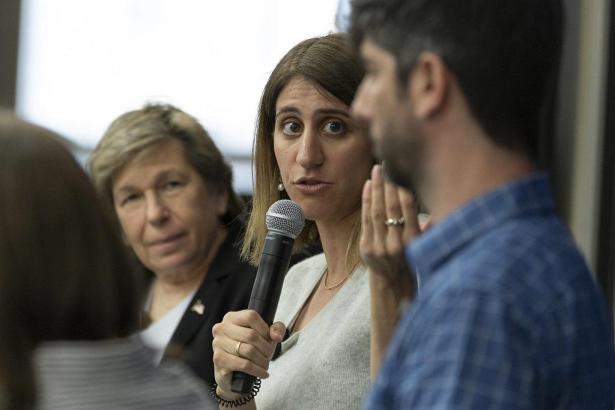That political violence is more likely to produce countervailing political violence than it is any kind of resolution acceptable to both sides is, or anyway should be, a law of political physics. Those who ignore or dismiss it tend to bring down catastrophes on their own people, as both Jewish Israelis and Palestinians should have long since learned, but tragically have not.
As The Washington Post reported last week, recent polling by the Israel Democracy Institute of both Jewish and Palestinian Israelis shows that most Jewish Israelis—63 percent—oppose the establishment of an independent and demilitarized Palestinian state. Fully 77 percent of those Jewish Israelis who describe themselves as “left” do support establishing such a state, but the share of Jewish Israelis who describe themselves that way had dropped to very low levels even before the October 7 attacks.
The drivers of actual policy on both sides of the conflict are ultranationalists: Hamas for the Palestinians, and the settlers-über-alles members of Netanyahu’s cabinet for the Israelis, who seek to drive all Palestinians out of both the West Bank and Gaza. Both those drivers envision an ethnically homogeneous state from the river to the sea, however effectively impossible that goal may be. At a time when violent maximalists fight violent maximalists, the hardest thing to find amid the current horrors is a trace of realism.
That trace, however, was eloquently presented last week at a remarkable forum hosted by the American Federation of Teachers (AFT). There, two young progressive Israelis—one Jewish, one Palestinian—made the case for a bilateral cease-fire and a two-state solution. Sally Abed, a Palestinian Israeli recently elected to the Haifa City Council, and Alon-Lee Green, who organized and founded Israel’s National Waiters Union, are both leaders of Standing Together, an organization of Israeli Palestinians and Jews working to promote civic equality and security, social justice, and the establishment of a Palestinian state.
Foremost among Standing Together’s missions, said Abed, is “debunking the myth that Jewish security depends on the military suppression of Palestinians.”
“We can’t do this by lecturing [Jewish Israelis] from a standpoint of moral superiority,” said Green. If Israel’s Jews are to support equality and a Palestinian state, said Abed, “they have to do it because they believe it’s in their own self-interest.”
Needless to say, both Green and Abed have received torrents of abuse from their respective communities for selling out, for preaching “Kumbaya” when war is required, for lack of the presumably messianic zeal that the moment demands.
In actuality, their strategy is rooted in sober left-wing analysis. “Israel is the hegemonic power” in the region, Abed said, and any strategy that ignores this reality is bound to fail. “There is no way to resolve this conflict that bypasses Israeli society,” Green added. “Outside pressure is very important, but the key question is Israelis’ political will. Just shouting ‘your truth’ isn’t changing reality. Changing that reality requires building power though a coalition” encompassing both Jews and Palestinians (as, in an infinitely less contentious arena, Green did in building a union of those two diverse peoples).
Abed fears the Palestinian movement may subside into even greater impotence once the current conflict ends. Reviving it, she said, requires “integrating it into Israel’s progressive camp,” which can’t be done if it simply champions Palestinian nationalism against Israeli nationalism. “It requires the Palestinian movement to be strategic,” she said.
AFT President Randi Weingarten, who hosted the session and had her union bring Abed and Green over from Israel to tour the U.S. and meet with the staffers on President Biden’s National Security Council, called the two visitors “heroes.” Their advocacy of a program and strategy that couldn’t be more at odds with those of the apostles of ultranationalism who now dominate discourse and policy in Israel and Palestine, and their supporters abroad, pits them against two very strong currents. Zealots in both the Middle East and the West have condemned the two as “moderates,” when they’re really anything but.
What sets Standing Together apart from these zealots is the realism that informs their strategy, politically marginal as that realism now may be. Hegemonic powers cannot be dislodged by fantasies of apocalypse or the kinds of terrorist attacks that Lenin termed “an infantile disorder.” It requires real politics—the kind of politics that’s foreign to Netanyahu, Mahmoud Abbas, Hamas, and their supporters both at home and abroad. It requires binational movement building, which at best may be the task of a generation. It’s well that Abed, Green, and the leaders of Standing Together are young. They are, for now, marginal (not magical) realists, working to build an alternative to the kind of nationalists about whom Yeats wrote, in chronicling the Irish civil wars,
We had fed the heart on fantasies,
The heart’s grown brutal from the fare.
[Harold Meyerson is editor at large of The American Prospect.]
Read the original article at Prospect.org.
Used with the permission. © The American Prospect, Prospect.org, 2024. All rights reserved.
Support the American Prospect.
Click here to support the Prospect's brand of independent impact journalism


Spread the word